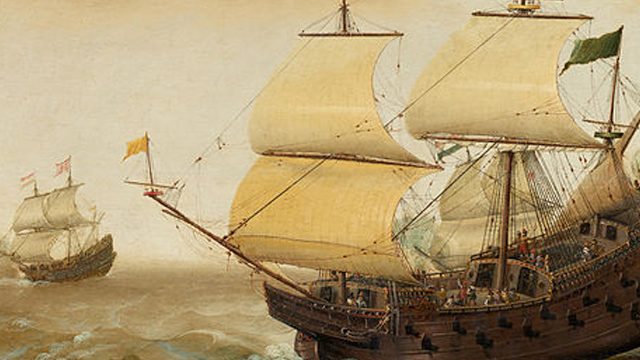SUMMARY
This is AI generated summarization, which may have errors. For context, always refer to the full article.
 Based on a press release by the Department of Foreign Affairs (DFA) last April 28, an Experts’ Round Table Discussion was held in the University of Santo Tomas (UST) to prepare the country’s nomination for the Manila-Acapulco Galleon Trade Route to the UNESCO World Heritage List.
Based on a press release by the Department of Foreign Affairs (DFA) last April 28, an Experts’ Round Table Discussion was held in the University of Santo Tomas (UST) to prepare the country’s nomination for the Manila-Acapulco Galleon Trade Route to the UNESCO World Heritage List.
According to the Secretariat, the nomination brings to life the significance of the Manila-Acapulco trade route in linking the continents of the world, which also paved the way for the faster exchange of goods, traditions, and cultural practices, considering it as the first sign of globalization.
It feels sad that the DFA may have forgotten the sufferings of our ancestors during the height of the Galleon Trade.
Indeed, the potential success of such nomination will not only distort the truth in our past, but it will also be an insult to the dignity of our ancestors who paid their blood at the expense of a grand mercantilist economic plan under an imperial power.
The polistas of the Galleon Trade

Every indio of working age was obliged under Spanish colonial rule to contribute labor in any number of capacities for a fixed amount of time each year. Indios were often recruited through the polo system as crewmen on galleons, as domestic servants or laborers, and as craftsmen in the shipyards. Each group of woodcutters typically numbered well into the thousands, sometimes reaching 8,000.
To save their ambitious plan, the Spaniards relied upon the native population as a means of keeping their ships seaworthy and maintaining the Galleon Trade. Worse, the Spaniards did not bother to compensate indios well just so they can increase their income from the monopolistic trade they established between Manila and Acapulco.
According to Andrew Peterson, a seasoned historian in Hawaii, “underpaying and overworking the indios yielded tremendous benefits for the Spanish who could now construct ships in the Philippines at a fraction of the cost in Europe or the Americas.”
Peterson also said many studies on the Galleon Trade only had a little look on the conditions of indios. For the Philippines, “thousands of indios served as the laborers, shipwrights, mariners, navigators, deckhands, and soldiers – often taking the duties the Spanish unwilling or unable to fulfill.” (READ: INFORGRAPHIC: A history of migration)
Also in Peterson’s work in 2011, 3 important historical documents require our attention:
- The 1782 report of Ciriaco Gonzales Carvajal states, “The cutting of wood is the most difficult and arduous of labors because they work from 4 in the morning to 8 at night. They are not given time to eat and rest, are poorly fed, exposed to the sun and wind in unpleasant, harsh and mountainous areas without any comforts, defenses or shelter for the few hours they are allowed to sleep.”
- Alonso Sanchez’s 1589 report to King Philip II revealed, “Indio woodcutters and shipyard laborers received only 4 reals a month, when at least 40 reals a month were needed to keep body and soul together.”
- Sebastian de Pineda’s 1619 report also said that the common indio woodcutters still only received 7 to 8 reals a month while those indios of greater skill who took part in the design and construction of vessels earned a meager 12 reals per month. In contrast, Spanish carpenters working in shipyards on Spain’s northern coast in the early 17th century earned around 135 reals per month.
Rethinking the nomination
The DFA must take a second look at such nomination.
We have to make sure that their story will be guarded from the political preoccupations of the few, and that the causes of their struggle will never be in any way forgotten.
It is our duty to pay back for their sacrifices by reinstilling to our fellow Filipinos the importance of our past as a way of guiding the decisions of our leaders in the present.
If we aim to recognize “early signs of economic and cultural exchanges” in our archipelago, we do not necessarily have to trace it back from theGalleon Trade. We had it before colonization – with Arabs, Malays, Indians, and Chinese (China actively traded with the people of Mindoro and Palawan as early as the Ming Dynasty).
Hence, a truly principled and purely Filipino nomination would rather recognize the maritime and shipbuilding skills of our pre-Hispanic ancestors which up to this day, runs in our veins as the 4th largest shipbuilder in the world.
Long before we built ships for our colonizers, our ancestors were building balangays not only for voyage and trade but also karakoas for war and defense. They built it as free people and for their people.
The way forward
The pains of the past will always be painful, no matter what it was or when it happened.
As much as we want to bury them in our once beleaguered land, we cannot deny the fact that it is our moral obligation as a nation to remember and bear the agonies of our great ancestors as our way of eternal respect. And we expect them to be reflected in our decisions today.
More than just being a route to early economic and cultural exchanges, the route also served as many indios’ path to death.
We cannot change history. But as a nation, the responsibility to speak for its truth is ours.
We suffered so much as indios of Imperial Spain centuries ago. Let us not be indios of ourselves today. – Rappler.com
Robert Joseph P. Medillo holds a Bachelor of Arts degree in Consular and Diplomatic Affairs from De La Salle College of Saint Benilde.
iSpeak is Rappler’s platform for sharing ideas, sparking discussions, and taking action! Share your iSpeak articles with us: move.ph@rappler.com.
Tell us what you think about this iSpeak article in the comments section below.
Add a comment
How does this make you feel?
There are no comments yet. Add your comment to start the conversation.